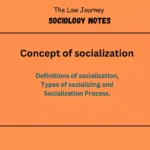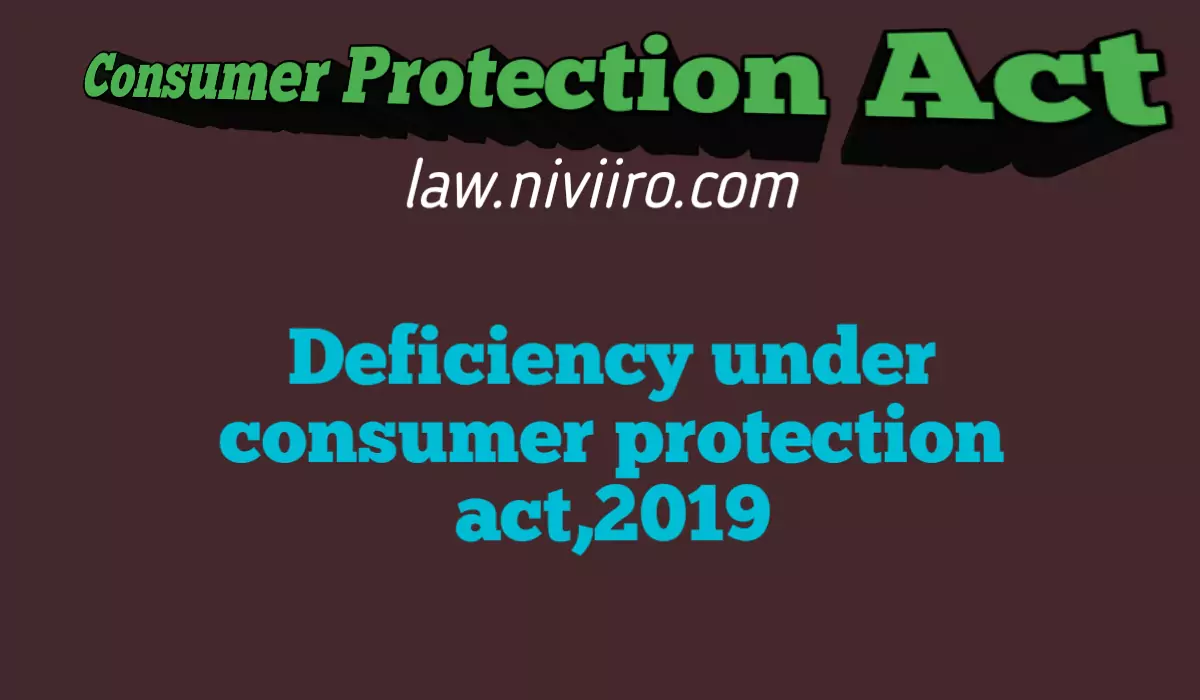Important Terms under Consumer Protection Act, 2019 –
Power to set aside ex parte orders [Section 61]
An ex parte order is an order issued by a court or authority without hearing the other party.
According to Section 61 of consumer protection act, 2019 only the national commission has been empowered to set aside ex parte orders.
When the National Commission issues an ex parte order, the aggrieved party could approach the Commission to set aside its decision.
If the aggrieved party applies to the National Commission, this provision gives the power of restoration by setting aside an ex parte order made by the National Commission on a previous occasion. Section 61 specifies that, in order to achieve the goals of justice, an ex parte order issued by the National Commission may be reversed if the opposing party or a complaint applies. This clause is founded on the idea of natural justice and fair play, which states that the Commission should hear the opposing party before making any decision.
Transfer of cases
In general, it means to transfer one case from one forum to another.
According to Section 17A of Consumer Protection (Amendment) Act, 2002 the State Commission may, at any stage of the case, transfer any complaint pending before the District Forum to another District Forum within the State on the application of a complaint or on its own direction, the interest of justice.
Similarly, under Section 62 of the Consumer Protection Act, 2019 the National Commission may, at any stage of the proceeding, transfer any complaint pending before a District Commission of one State to a District Commission of another State or from one State Commission to another State Commission on the application of the complainant or on its own motion, in the interest of justice.
Circuit Benches
In general, it means to have more than one benches or centres connected to one circuit or authority.
According to Section 17B of Consumer Protection (Amendment) Act, 2002 the State Commission generally functions in the Capital of the state, but may exercise its functions at any other location that the State Government with consultation with the State Commission, notifies.
According to Section 22C of Consumer Protection (Amendment) Act, 2002 the National Commission generally functions in New Delhi but can exercise its functions in such other locations as the Central Government in consultation with the National Commission, notifies.
Finality of Orders [Section 68]
In general, it means the orders made by the commissions shall be final and binding.
Every order of a District, State or National Commission shall be final, if no appeal has been preferred against such order under the provisions of the Consumer Protection Act.
There is no provision of appeal against the order of Supreme Court, the highest appellate court in India, and its order shall be final and binding.
Judicial Review
Judicial review is a well-established procedure that permits Courts to review orders or judgments given by subordinate Courts or the same Courts if there is a prima facie mistake of law or a miscarriage of justice.
Review by National Commission in certain cases [Section 60]
The National Commission shall have the power to review any of the order passed by it if there is an error apparent on the face of the record, either of its own motion or on an application made by any of the parties within thirty days of such order.
Review by State Commission in certain cases [Section 50]
The State Commission shall have the power to review any of the order passed by it if there is an error apparent on the face of the record, either of its own motion or on an application made by any of the parties within thirty days of such order.
Review by District Commission in certain cases [Section 40]
The District Commission shall have the power to review any of the order passed by it if there is an error apparent on the face of the record, either of its own motion or on an application made by any of the parties within thirty days of such order.
Public interest Litigation
According to Black’s Law Dictionary, public interest litigation is a legal action brought in a court of law to enforce a public interest in which the public or a class of the community has a monetary or other interest that affects their legal rights or liabilities.
A PIL can be filed in either the high court or the Supreme Court for the sake of public interest. You can only file a lawsuit in national consumer court if you are a consumer. You cannot file a case if you do not meet the criteria of a consumer. Furthermore, according to the law, a PIL cannot be filed in a national consumer forum.
The PIL under Articles 32 and 226 as well as the relaxation of the law of locus standi, allowed the common man to actualize his right to live with human dignity and to consume products and services of high quality. PIL gives legal representation to unrepresented groups by recognising the concerns of marginalised, environmentalists, consumers, and minorities.
Environmental protection, consumer justice, and sustainable development, land and energy use, tax reform, occupational safety, health care, media access, corporate responsibility, educational reform, employment benefits, labour law enforcement, and gender justice are all examples of policy-oriented justice.
Class Action
A “class action” is a legal procedure that permits a group of consumers who have similar complaints or grievances against a common defendant (typically a company or service provider) to seek redressal for their problems collectively. This provision is intended to provide an effective and simple mechanism for addressing consumer complaints where a group of customers is affected by the same issue.
A consumer complaint should fulfill these criteria to be a ‘Class Action’ –
- There should be a similar interest and a shared interest of all customers joining together.
- The complaint should be represented by a single leading case for the protection and benefit of all consumers.
- The nature of a “class action” against the same party with the same purpose will not be affected by factors such as cost, size, booking date, and price uncertainty.
- The complaint’s substance should not be centred on a single party; rather, it should speak for all customers.
Landmark case – Nestle India Maggi Noodles
Nestle India Ltd. was sued before the National Consumer Disputes Redressal Commission. After testing it revealed that the famous 2-minute Maggi noodles had excessive amounts of lead and MSG. As interpreted, the case was a class action filed on behalf of all customers, seeking Rs 640 crores in damages for alleged unfair trade practises, false labelling, and misleading advertisements.
Administrative remedies
“Administrative Remedies” refers to the numerous measures and actions that consumer protection authorities and agencies can use to resolve consumer issues and complaints. In India, the Consumer Protection Act, 2019, establishes a central consumer protection authority and state-level consumer protection authorities, both of which are responsible for promoting, safeguarding, and enforcing consumer rights.
- Complaint Redressal: To seek remedy for grievances, the Act established Consumer Disputes Redressal Commissions at the district, state, and national levels.
- Cost Reimbursement: In cases of defect or deficiency, the consumer protection authority may require reimbursement of the consumer’s expenses.
- Mediation: To find a mutually acceptable settlement, the consumer protection authority may send the matter to mediation.
- Product Recall: The central authority has the ability to order the recall of hazardous items or goods that endanger the health and safety of consumers.
- Replacement or Repair: The authority has the ability to require the firm to either replace the defective product with a new one or repair the product for free.
- Penalties and Fines: The Act gives the authority the ability to impose penalties and fines on businesses that breach consumer protection laws.
- Refund: The authority may require the firm to refund the price paid by the customer for the defective product or service.
- Withdrawal of False Advertisement: If a company is found to be engaging in false or misleading advertising, the authority can order to removed the advertisement and impose penalties.
Related Post | Important Terms under Consumer Protection Act, 2019
- Standard of Goods – Consumer Protection Act
- Consumer Protection Councils
- Consumer of Goods – Consumer Protection Act
- Consumerism in India – Meaning | Need | Objects
- Rights and Duties of consumers | Consumer Movement
- Political Notes
- Law of Torts notes
- RTI notes
- Legal History Notes
1. What do you mean by the term ‘Administrative remedies’ under consumer protection act?
“Administrative Remedies” refers to the numerous measures and actions that consumer protection authorities and agencies can use to resolve consumer issues and complaints. In India, the Consumer Protection Act, 2019, establishes a central consumer protection authority and state-level consumer protection authorities, both of which are responsible for promoting, safeguarding, and enforcing consumer rights.
2. What do you mean by the term ‘Class action’?
A “class action” is a legal procedure that permits a group of consumers who have similar complaints or grievances against a common defendant (typically a company or service provider) to seek redressal for their problems collectively.
3. What do you mean by the term ‘Public interest litigation’ under Consumer Protection Act?
According to Black’s Law Dictionary, public interest litigation is a legal action brought in a court of law to enforce a public interest in which the public or a class of the community has a monetary or other interest that affects their legal rights or liabilities.
4. What do you understand by the term ‘Judicial Review’ under consumer protection act?
Judicial review is a well-established procedure that permits Courts to review orders or judgments given by subordinate Courts or the same Courts if there is a prima facie mistake of law or a miscarriage of justice.
5. What do you understand by the term ‘Finality of orders’?
In general, it means the orders made by the commissions shall be final and binding. Every order of a District, State or National Commission shall be final, if no appeal has been preferred against such order under the provisions of the Consumer Protection Act.
6. What do you understand by the term ‘Circuit Benches’?
According to Section 22C of Consumer Protection (Amendment) Act, 2002 the National Commission generally functions in New Delhi but can exercise its functions in such other locations as the Central Government in consultation with the National Commission, notifies.
7. What do you understand by the term ‘Transfer of cases’?
Under Section 62 of the Consumer Protection Act, 2019 the National Commission may, at any stage of the proceeding, transfer any complaint pending before a District Commission of one State to a District Commission of another State or from one State Commission to another State Commission on the application of the complainant or on its own motion, in the interest of justice.
8. What is ex parte order?
An ex parte order is an order issued by a court or authority without hearing the other party. According to Section 61 of consumer protection act, 2019 only the national commission has been empowered to set aside ex parte orders.
Reference Books | Important Terms under Consumer Protection Act, 2019
- Consumer Protection Law by Dr.SC Tripathi
- Consumer Protection Act: A Commentary by G. B. Reddy
- Commentary on the Consumer Protection Act by J. N. Barowalia
- Consumer Protection (Law & Practice) by V. K. Agarwal




















